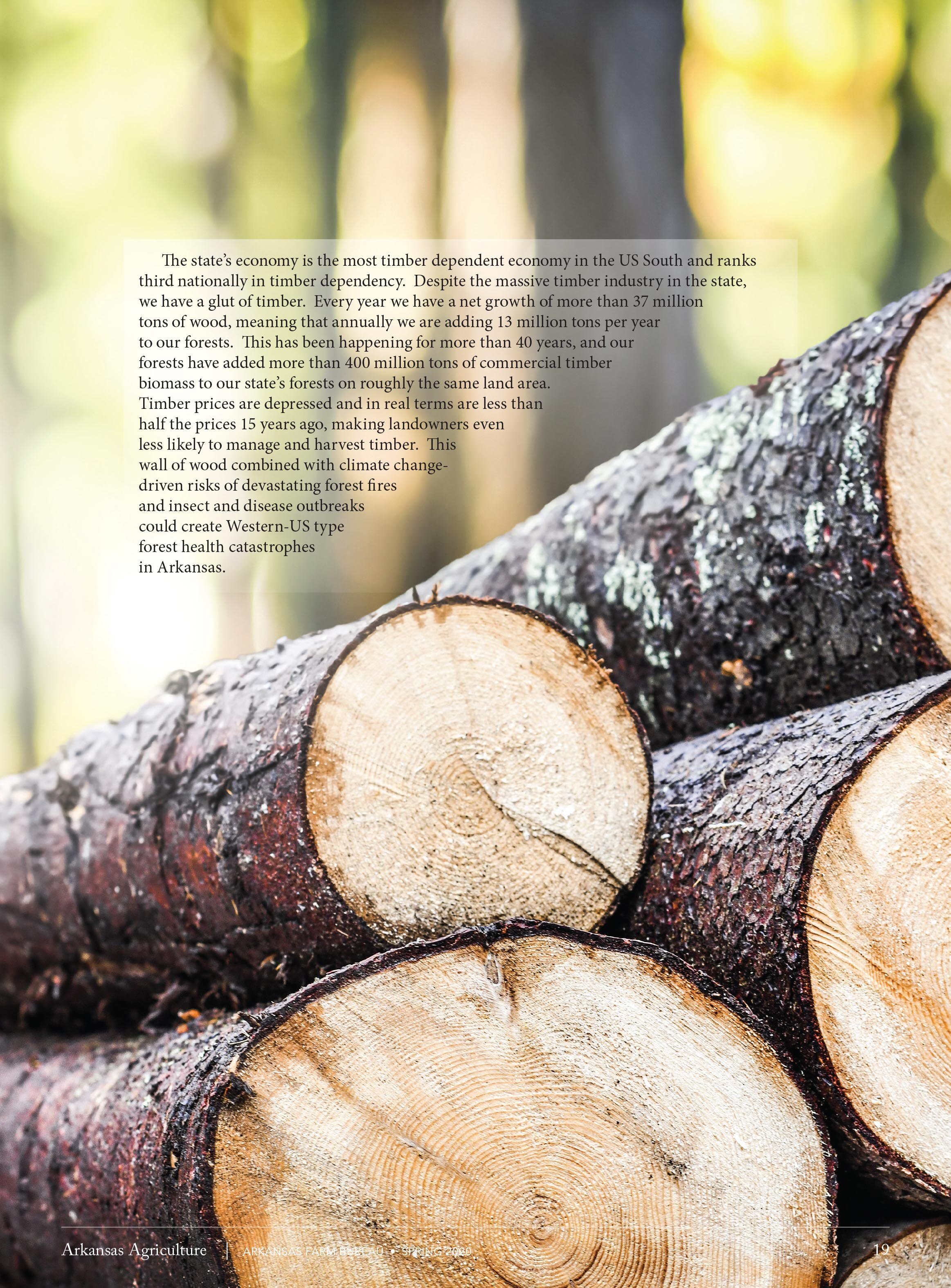LATEST NEWS
Timber Industry Asks Congress for $2.5B in COVID-19 Aid
PLEASE URGE YOUR FEDERAL REPRESENTATIVES TO APPROVE THESE MEASURES (HR 7690 AND S.4233) BY SUBMITTING YOUR LETTER TO CONGRESS NOW! (TAKES LESS THAN 5 MINS)
Passed over in previous pandemic relief measures, the timber industry is asking Congress for at least $2.5 billion to help businesses recover from financial losses.
Logging companies are counting on Sen. Susan Collins (R-Maine) and Rep. David Rouzer (R-N.C.), among others, to push for grants and loans that would help companies that saw revenue decline at least 10% due to the pandemic.
The lawmakers could introduce legislation within days, industry and congressional sources said, with the aim of attaching it to a forthcoming COVID-19 relief package. Republican leaders in the Senate may introduce that bill this week.
According to industry sources, logging companies in some states have seen revenue drop off as much as 30% thanks to slowdowns in home construction and other business that rely on a steady supply of wood.
Even the paper industry, bolstered by increased production of toilet tissue, for instance, has seen product lines such as school supplies shrink dramatically, said Daniel Dructor, executive vice president of the American Loggers Council.
Sen. Susan Collins (R-Maine) is leading legislation to help the timber industry during the pandemic. Francis Chung/E&E News
If losses continue without help from the government, Dructor told E&E News, "we'll be hard-pressed to rebuild this industry."
Logging companies see themselves on an even level with agriculture, and farmers have seen help from Congress from the earliest measures, said Dructor, whose organization represents timber industry groups and companies in 36 states. "We felt like they had been impacted just as much," he said.
The measure being pressed by loggers would provide assistance to companies that experienced losses of 10% from January to July, compared with a year earlier, Dructor said.
The money would begin as a bridge loan from the Department of Agriculture, to be converted to a grant later if the company can prove losses of at least 10%, according to a letter from the Loggers Council to lawmakers.
USDA oversees federal forestry programs, and Agriculture Secretary Sonny Perdue has publicly said he sees trees as crops, albeit with a longer growing cycle.
The Loggers Council told lawmakers, "This program is intended to ensure that contractors can have the opportunity to remain in business over the next 12 months and to adjust their operations as markets begin to stabilize."
The group estimated state-level losses to loggers of around 30% of production in North Carolina. Other states reported financial shortfalls of $115 million in Alabama, $99 million in Georgia and $52 million in Florida, with all the figures provided by state logging associations.
Dructor said most of the companies in question are smaller, family-run operations. Like farmers, he said, they tend to have high fixed costs. They rely on trees taken from a combination of private land and federal land, including national forests, he said.
The outlook for wood products is mixed, and the Loggers Council said it expects the slowdown to extend into next year.
While home improvements and demand for paper packaging have increased during the pandemic, giving the industry a boost, the biggest piece of the U.S. industry — lumber used in construction and home renovations — has been hard hit. The effects are likely to last through this year, according to Hancock Natural Resource Group, a farmland and timberland investment group, in a May report. Earlier in the pandemic, the Forest Service said it would extend contract deadlines on timber sales and give companies more time to make timber sale payments to the federal government.
LOGGING: Collins, Golden Propose Bipartisan Plan to Help Loggers, Timber Haulers Weather COVID-19 Economic Crisis
Under lawmakers’ bill, logging & hauling businesses that have experienced losses of 10 percent or more would qualify for direct payments from USDA In Maine, timber harvest expected to be down over 20 percent in 2020 due in large part to COVID-19, Androscoggin Mill explosion.
WASHINGTON — U.S. Senator Susan Collins (R-ME), Congressman Jared Golden (ME-02), Congressman David Rouzer (NC-07), and Senator Tina Smith (D-MN) today introduced bipartisan, bicameral legislation to provide relief to family logging and log hauling businesses that have been seriously impacted by COVID-19 and the resulting economic crisis. Senator Angus King (I-ME) is a co-sponsor of the bill.
The lawmakers’ bipartisan bill would establish a new program at the U.S. Department of Agriculture (USDA) to provide direct payments to timber harvesting and hauling businesses that can demonstrate they have experienced significant economic hardship compared to the previous year. The logging industry has experienced a steep decline in demand for wood fiber since the coronavirus pandemic began, leading to an estimated 20 percent or more drop in the timber harvest this year.
“Throughout Maine’s history, our forest products industry has created good-paying jobs, driven local economies, and sustained rural communities,” said Senator Collins. “This industry was already facing significant headwinds due to a changing 21st century economy and unfair trade practices, as well as the explosion at the Androscoggin Mill in Jay and the shutdown of the paper machine at Sappi in Westbrook. COVID-19 has only compounded these challenges. Maine’s family logging and log hauling businesses need our support. Our bipartisan bill would provide critical financial assistance to the skilled professionals who work in this industry to help them get through this difficult period.”
“Logging has provided good jobs and supported rural communities in Maine for generations,” said Congressman Golden. “But today, our loggers and truckers face two major challenges they have no control over: sinking demand from the coronavirus recession and a disruption in the market following the accident at the mill in Jay. Congress has recognized the unique role farmers and fishermen play in their rural communities, and taken action to provide relief funds to those industries. Loggers are taking a serious hit and deserve the same support. I’m proud to work across the aisle with Congressman Rouzer, Senator Collins, and Senator Smith to help our loggers and log haulers make it through these difficult times.”
“We need to support Minnesota’s diverse timber industry during the downturn caused by the coronavirus pandemic,” said Sen. Smith. “This bipartisan legislation will provide critical relief to loggers and timber trucking businesses whose revenues have suffered during this unprecedented time. For the sake of Minnesota forest products, and the jobs they support, we need to move this bill forward."
The program envisioned in Collins and Golden’s bill is modeled after the USDA’s Coronavirus Food Assistance Program, which has been providing direct relief to growers and producers experiencing dramatic drops in prices and overall business activity due to the pandemic. Specifically, the legislation would direct the Secretary of Agriculture to provide payments to eligible logging businesses that have experienced at least a 10 percent loss in revenues from January through July 2020 as compared to the same timeframe last year. Those who qualify would receive direct payments equal to 10 percent of their gross revenue from January through July of last year, and would only be permitted to use the funds for operating expenses, including payroll.
Under the CARES Act, Congress has already provided $300 million to the nation’s fishing industry and $16 billion for dairy and livestock producers as well as fruit and vegetable growers.
“Since the onset of the COVID-19 pandemic, our small, family owned and operated logging business has been hurt significantly by strict quotas in some markets and completely shut off in others. This, all occurring on the heels of our seasonal shut down time, multiplies the financial burdens on our business and family. We also don’t see the future getting any better and are struggling for survival. The financial assistance being proposed in this legislation would significantly help us pay our fixed costs so we can survive limited production and continue to harvest necessary, renewable resources for our nation.” - Randy Kimball, President, Kimball & Sons Logging and Trucking, LLC of Poland
“We all feel the effect COVID-19 is having on the world today. Logging and Trucking companies in Maine have come across these difficulties as well, with the loss of wood markets and many other mills on quotas or not taking wood at all. We have certainly been challenged in these unprecedented times. Our companies certainly could use some help to survive these trying times without losing any more valuable loggers and truckers forever. Thank you Senator Collins and Congressman Golden for all of your efforts on our behalf.” - Jim Nicols, President of Nicols Brothers Logging Inc. of Mexico
“In April of this year we shut down our logging operations because of lack of markets and price reductions state-wide related to the 2020 COVID Crisis. For the first time in my 40-year career, my sons and I have decided not to return to the forest for the summer season! We will wait until fall and then choose a path forward. We were hopeful something good can transpire between now and then and this legislation from Congressman Golden and Senator Collins could be it. What a shame it would be to lose the talent of my son's and our valuable crew from the Maine Woods! Let’s hope it doesn’t come to that.” - Duane Jordan, President, Elliot Jordan & Son, Inc. of Waltham
“The economic uncertainty and loss of markets created by the COVID-19 pandemic have hit the Maine logging and forest trucking industry at a time when it was already suffering from the effects of a mild winter, early spring, and low profit margins. Without federal relief, many in this industry will not survive. They need help now, and we are thankful for Senator Collins' and Rep. Golden’s recognition of these challenges and for working towards a solution that can keep our hard-working logging and trucking families employed while preserving the future of the industry and the rural communities that depend on it." - Dana Doran, Executive Director of the Professional Logging Contractors of Maine
Maine’s logging industry is a linchpin of the state’s economy, generating an estimated $619 million in economic output, and providing $342 million in income to around 9,000 Mainers, most of whom live in rural communities. The industry suffered a serious setback in April when a digester at the Androscoggin Mill in Jay exploded, shutting the facility down temporarily and reducing its capacity upon reopening. The facility is one of the largest timber purchasers in the state, receiving approximately 150-175 truckloads of wood each day under normal conditions.
MSU Study on Log Truck Accidents on Interstates in Mississippi 2014 to 2018
By: Dr. John B. Auel, Assistant Extension Professor, Department of Forestry, College of Forest Resources, Mississippi State University
July 17, 2020 - Introduction Forestry contributes an estimated $12.8 billion annually to the Mississippi economy . It is the second most valuable agricultural commodity. The average annual harvest of forest products from 2014 through 2018 is in excess of 31.5 million tons , with log trucks (includes trucks with log trailers, pole trailers, and chip vans) being the primary mover from the woods to the mills. Moving that volume of material requires over 1.2 million loaded trips per year, at an average of 25 tons per trip. Each loaded trip also requires an empty return, doubling that number to 2.4 million trips each year. If the average distance to the mill from the woods is 40 miles (80 miles round trip), each year log trucks travel 96 million miles transporting wood harvested in Mississippi.
Mississippi Log Truck Accidents from 2014 through 2018
According to the Mississippi Department of Transportation (MDOT), between January 1st, 2014 and December 31st, 2018 there were 1,376 accidents involving log trucks investigated by MDOT, for an average of 275 per year. MDOT provided GPS coordinates and accident descriptions to MSUES. The descriptions did not include detailed information but was the original form filled out by the officer on-scene. Information is lacking in most cases. Also, it is not possible to determine fault in many of the cases. Some are clearer than others though and some inferences can be made. Regardless of the lack of details, this information provides a decent window into issues with trucking in the state.
The actual volume estimates from MS Severance Tax data for the same time period, shows approximately 158.5 million tons of wood was harvested from forestlands in the state. At 25 tons per load for the average log truck, that is 6.3 million loaded truck trips, or 12.6 million loaded and empty trips from January 2014 through December 2018. Put another way, there was only one log truck accident, investigated by MDOT, for every 9,211 log truck trips in the state.
Interstate Accident Locations: Log truck accidents are uncommon on interstates, but the main reason for this is that they seldom run on the interstates when compared to other vehicles. Accident locations were uploaded to ArcGIS as a layer. This layer was placed on county and major highway layers to identify locations. The coordinates were not always accurate, so accident descriptions for each appearing to occur on an interstate highway were examined for specific road information. Only accidents that occurred on an interstate highway or ramp were included. Many accidents that appeared to be on the interstate highways occurred on surface streets adjacent to the interstates. These were omitted. For example, an accident that occurred on an off ramp where a truck rear-ended another vehicle at the end of the ramp was counted as part of interstate use accidents. An accident that occurred as a truck was turning onto a surface street after stopping safely at the end of the off-ramp was not counted since the accident was not integral to interstate use.
There was enough information contained in each accident description to categorize the potential cause and to make some assumptions regarding underlying causes. For example, broken drive shafts were listed under equipment as a primary factor. An underlying factor may well be maintenance. If nothing else, this will give the PLM program a chance to emphasize aspects of log trucking that need improvement.
Results: There was a total of 49 accidents occurring on interstates between January 2014 and December 2018. This represents 3.6% of all log truck accidents. The following table shows the number of accidents for each interstate highway in Mississippi. Click here to view the full study.
Spanberger Welcomes Reforestation Priorities in Infrastructure Package
Tommy Mattocks, tommy.mattocks@mail.house.gov
WASHINGTON (July 1, 2020) – House Agriculture Conservation and Forestry Subcommittee Chair Abigail Spanberger of Virginia welcomed the inclusion the Reforestation Trust Fund in the Manager’s amendment to the House Democrats’ infrastructure package, The INVEST in America Act, assed on Tuesday. Spanberger, who authored an amendment to address the needs of the RTF along with Subcommittee Ranking Member Doug LaMalfa of California and Committee Member Jimmy Panetta of California, issued the following statement:
“Our forests are a national treasure, providing essential recreation and renewable natural resources for the communities they support. To maintain that treasure, we must address the reforestation needs of this valuable resource,” said Spanberger. “Reforestation means investment in green infrastructure and the benefits to the climate that come with it, including increased carbon sequestration capacity, improved habitat, and more. Additionally, nearly 20 percent of the drinking water in the United States originates from National Forest System lands. Currently, there is a million-plus acre backlog of reforestation needs in our National Forests, and I am very glad to see the bipartisan Panetta-LaMalfa-Spanberger amendment included in the manager’s amendment to H.R. 2. The commonsense change that our amendment proposes would double our investment in reforestation of National Forests each year, at no cost to taxpayers.”
Biomass: Netherlands to Double Wood Pellet Imports in 2020
The Netherlands doubled its wood pellet imports to a record 1.22 million metric tons in 2019, according to a report recently filed with the USDA Foreign Agricultural Service’s Global Agricultural Information Network. Imports are expected to double again this year based on the co-firing plans of Dutch power companies. The report explains that the Netherlands imported more than 1 million metric tons of wood pellets in 2012. U.S. was the top supplier of pellets to the Dutch power companies at that time, accounting for 600,000 metric tons of imports.
Dutch imports of wood pellets stagnated from 2013 to 2017 due to the termination of government support for the use of woody biomass for energy generation. Subsidies resumed, however, in 2018 and 2019. As a result of those subsidies, the Dutch power sector imported 1.22 metric tons of wood pellets at a value of $232 million last year. Few of those pellets were imported from North America. Dutch power companies primarily sourced wood pellets from Latvia, Estonia, Lithuania and Russia in 2018 and 2019.
Sustainability requirements are a primary factor limiting U.S. wood pellet exports to the Netherlands. The report explains that pellets must be certified at the forest level. In the U.S., biomass for pellet production is generally sourced from small forest owners who do not have a program certification.
According to the report, the Dutch government has developed a verification protocol as an alternative to certification to facilitate pellet imports. Importers, however, are often reluctant to utilize the system due to a fear that product might be determined to be non-compliant after delivery.
The Netherlands consumed an estimated 1.197 million metric tons of wood pellets in 2019, up from 614,000 metric tons in 2018. Consumption is expected to increase to 2.25 million metric tons this year. The country imported 1.223 million metric tons of wood pellets in 2019, with 130,000 metric tons of that volume coming from the U.S. Imports are expected to reach 2.5 million metric tons this year, with the U.S. supplying up to 500,000 metric tons of that volume.
A full copy of the report can be downloaded from the USDA FAS GAIN website.
President Trump announced his intent to nominate William Perry Pendley to be the Director of the Bureau of Land Management
Today, President Trump announced his intent to nominate William Perry Pendley to be the Director of the Bureau of Land Management.
Mr. Pendley currently serves as the Bureau of Land Management's Deputy Director for Policy and Programs, exercising the authority of the director. He also has decades of experience in federal land management policy as an attorney. Born and raised in Cheyenne, Wyoming, Mr. Pendley received B.A. and M.A. degrees in Economics and Political Science from George Washington University in Washington, D.C. He was a captain in the U.S. Marine Corps. Mr. Pendley has a distinguished background of public and private service. During the Reagan Administration, he served as Deputy Assistant Secretary for Energy and Minerals of the Department of the Interior, where he authored President Reagan's National Minerals Policy and Exclusive Economic Zone proclamation. He presided over the Mountain States Legal Foundation for nearly 30 years before joining the BLM last year.
718 ADVANCES TO G-SERIES
The last machine in the drive-to-tree feller buncher line-up advances to G-series.
Tigercat engineering recently completed the drive-to-tree feller buncher line-up with the release of the 718G. One of the last Tigercat machines to receive a Tigercat FPT Tier 4 engine, it was a challenge to package the additional after treatment componentry required for Tier 4 compliance, while still retaining the nimble size of the industry’s finest thinning machine. The designers have succeeded, incorporating all of the features of the larger G-series family members, as well as additional enhancements, while maintaining the approximate size of the previous E-series machine.
The 718G gets its power from the Tigercat FPT N45 Tier 4f engine which provides 125 kW (170 hp) at 2,200 rpm. The completely redesigned engine compartment allows for a high capacity cross-flow cooling set-up with a hydraulic driven, automatic variable speed fan and an automatic reversing cycle. The new compartmentalized layout keeps the cooling system, hydraulic components, and engine in three separate areas.
The new accumulation mode allows the operator to choose between normal and auto-accumulate for bunching head arm operation. Simultaneous open and close of the clamp and accumulator arms can also be programmed on a joystick button. A saw interrupt trigger on the joystick turns off saw power temporarily when extra horsepower is required. This is particularly useful in hilly terrain once the saw head is full and the operator is backing up to dump the accumulated bunch.
The G-series cab is quiet and well-equipped and affords excellent visibility. LED lights improve reliability and brightness. A more even light pattern provides better coverage around the machine. The front window area is nearly ten percent larger. Combined with Tigercat’s low-profile boom structure, visibility to the front is unmatched. The rear quarter windows are over twenty percent larger improving the view over the back tires – an asset in thinning applications.
Additional new features include a rear camera system, programmable joystick buttons, electric hydraulic fill pump, and ground-level fueling. Enhanced differential lock controls are timed to turn off after a pre-set duration to save axle wear.
Timber Harvesting's 2020 Business Outlook & Covid-19 Impact Survey
Across the nation, 311 loggers participated in the Timber Harvesting 2020 Business Outlook & Virus Impact Survey, conducted from mid April through the end of May 2020.
Asked to list all the ways the viral economy has affected their operations, loggers responded with three big issues:
71% Cited Mill Quotas
61% Lost Revenues
59% Mill Downtime
More than a third (34%) of loggers have seen lowered logging rates, and 27% have delayed equipment purchases as a result.
Additional impacts include employee layoffs (11% of loggers), and downsizing one or more crews (7%).
Longer hauls are in the mix for 13% of loggers, and more than one out of every five (22%) have had logger certification or safety training sessions delayed.
Asked to rate their top three business concerns, loggers overwhelmingly said maintaining markets, cited by 82%. Next biggest concern is logging rates, cited by 48% of loggers. The third biggest concern is a virtual dead heat between two issues: 41% of loggers said insurance costs—particularly for trucking—followed closely by weather, cited by 40% of loggers.
Source: http://www.timberharvesting.com/survey-details-outlook-virus-impact/
Timber Market Woes from COVID-19 - Arkansas
By Matthew Pelkki, Professor and Clippert Endowed Chair of Forestry College of Forestry, Agriculture, and Natural Resources University of Arkansas at Monticello
Results: Loggers Covid-19 Federal Assistance Survey
72% of respondents (all in logging &/or log hauling business) have applied for assistance.
92% of respondents that have applied for funding have been approved for funding.
84% of those who have applied have looked for assistance with the Payroll Protection Program.
12% of those who have applied have looked for assistance with the Economic Injury and Disaster Loan Program.
4% of those who have applied have looked for assistance with the SBA Bridge Loan Program.
Less than 1% have applied for the USDA Rural Development Business and Industry Cares Act Program.
















